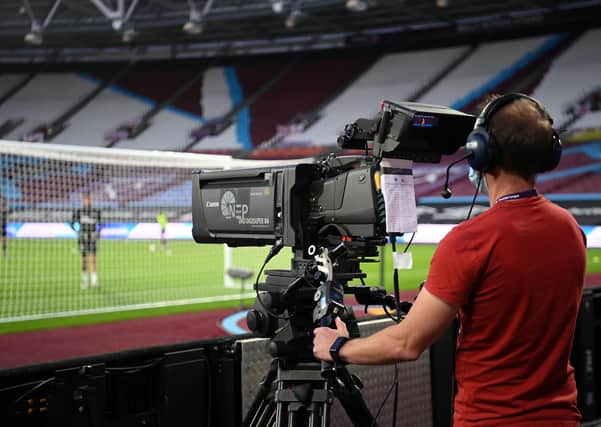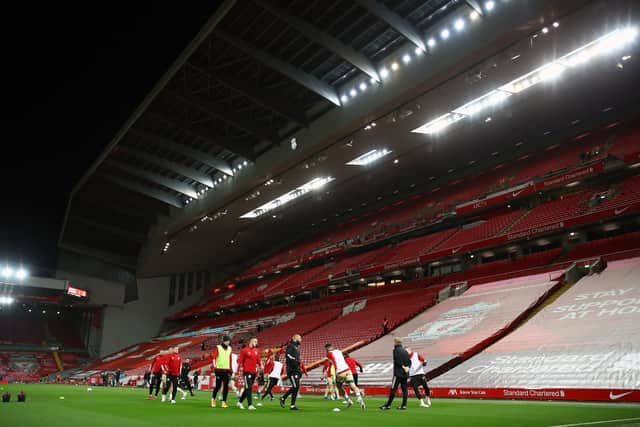Premier League have fanned flames they cannot control with pay-per-view


Yet when it comes to pay-pay-view Premier League football, England’s top clubs have decided to kick the can down the road and take more of their fans’ money before they think again.
Hopefully, some time in November they will confront the issue, see the error of their ways and put matters right, as they had the chance to on Tuesday. The longer they take to address the anger they have stirred, the more costly it could be for them in the long run.
Advertisement
Hide AdAdvertisement
Hide AdGiven how deaf the Premier League has been to public opinion so far, we cannot take it for granted.
In these strange times, there is nothing wrong with pay-pay-view football.
The Premier League has tried it before, setting up its own pay-per-view channel in 2001 to sell matches direct to supporters, but had to abandon the idea because of lack of interest. If we thought Sheffield United’s 2007 trip to Aston Villa, the last match on “Prem Plus”, was the end of the matter, we probably should have known better.
Now, though, the idea has some merit. Fans have been locked out of grounds since March – unless, ridiculously, they want to go to a pilot at a designated bar there to watch a game on television with the windows blocked so they cannot, horror of horror, see 22 men kicking a football directly.
Advertisement
Hide AdAdvertisement
Hide AdGiven the Government does not believe it is safe for them to sit, socially distanced, outdoors and watch games in person, it is not unreasonable to allow them to view them on television instead. It is the idea at a time of such economic hardship that they should be asked to pay £14.95 to watch not the best games but the ones Sky and BT have turned their noses up at that has offended so many.


Even Newcastle United owner Ashley – whose business practices are rarely designed to curry favour – argued in public and at Tuesday’s Premier League board meeting for £4.95 a game until Christmas.
Even after a few weeks it is obvious what a public relations disaster £14.95 has been.
“It’s finished, no-one is paying for it, no-one is watching it, it’s done,” Sky Sports’ most high-profile employee, Gary Neville, argued on its Premier League channel. The broadcasters are said to be concerned they are being tainted by association.
Advertisement
Hide AdAdvertisement
Hide AdA swift apology and a price cut might have rectified the situation but the delay will cost Leeds United fans another £14.95 to watch their game at Crystal Palace.
The contempt for supporters has actually not been totally negative. More than £300,000 has been raised for charity – mostly foodbanks, highlighting another area where those in authority have been tone deaf to the national mood – by fans boycotting matches and donating the £14.95. Even those of clubs yet to have a pay-per-view game have donated.
The Premier League are obviously hoping this all blows over but may have fanned flames they cannot control.
What has historically allowed it to ride increasingly roughshod over supporters is the knowledge these are addicts, and there are always enough mugs who will pay for the malcontents and those who simply cannot to be ignored.
Advertisement
Hide AdAdvertisement
Hide AdHence the ridiculous kick-off times that drag fans up and down the country at great expense and sometimes short notice to suit broadcasters.
Leeds took the fight to Sky in the Championship but their money is so fundamental to the Premier League model it is not something many clubs are brave enough to do. When you pay the eye-watering sums Sky and BT do to show live Premier League football, you are probably entitled to call the shots. If you want a more (real) fan-friendly product, accept less money.
It is different in Germany, where fans hold far more sway.
Bundesliga supporters are far more likely to boycott a game because – brace yourself for this – it is played on a Monday night.
This season, some English fans will have watched the illegal streams which are such a threat to the Premier League’s business model for the first time but many diehards have just got used to not going to the game, many armchair fans to not seeing them live at all.
Advertisement
Hide AdAdvertisement
Hide AdGoing to the game was a habit. Even though in some cases more often than not the football was miserable and the results worse, it was a social occasion, a ritual.
As long as there were bums on seats – or increasingly direct debit payments in television companies’ bank accounts – the show could go on as the ringmasters pleased.
But if the Premier League gets fans into the habit of boycotting games when they get angry about being pushed around, that is a game-changer. Suddenly the power is back in the hands of the people. Ignoring them will no longer be a long-term option.
The Premier League executives could live to regret giving supporters a taste for boycotts.
Advertisement
Hide AdAdvertisement
Hide AdSupport The Yorkshire Post and become a subscriber today. Your subscription will help us to continue to bring quality news to the people of Yorkshire. In return, you’ll see fewer ads on site, get free access to our app and receive exclusive members-only offers. Click HERE to subscribe.
Comment Guidelines
National World encourages reader discussion on our stories. User feedback, insights and back-and-forth exchanges add a rich layer of context to reporting. Please review our Community Guidelines before commenting.